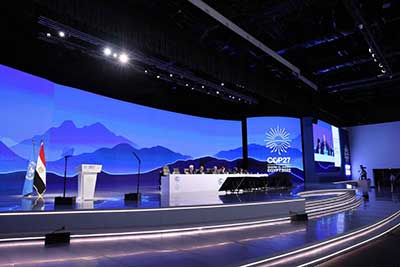Date: 07/12/2022
Relevance: GS-3: Conservation, environmental pollution and degradation, environmental impact assessment.
Key Phrases: Shrinking of Their Policy Space And Human Rights, Late Urbanisers, Environmental Aggressors, Lifestyle For Environment, Just Transition For Developing Countries, Carbon Budget Formalizes A Diversity Of Solutions.
Context:
- In the climate negotiations, areas of interest to developing countries are not covered or sparsely covered, while other areas are over-regulated.
- At COP27, the policy debate was not legitimized by science and a concerted effort was made to change the basic structure of the Climate Treaty.
Problems with the current climate negotiation process:
- Carbon intensive urban lifestyles in developed countries: Citizens in developed countries are not aware that two-thirds of their national emissions of carbon dioxide come from their diet, transport, and residential and commercial sectors.
- Need of fossil fuels for urbanization process: The process ignores that global well-being will follow urbanisation of the developing country’s population which will require fossil fuels for infrastructure and energy to achieve comparable levels.
- No consideration for essential emissions in developing countries: The need for vast quantities of cement and steel in developing countries for infrastructure constituting essential emissions, as they urbanise is not being considered.
Concerns of late urbanisers:
- As late urbanisers, developing countries account for more than half the annual emissions and most emissions growth and they cannot affordably access many of the new technologies to decarbonise quickly.
- The result is a shrinking of their policy space and human rights, endangering efforts to achieve comparable levels of well-being with those who developed earlier without any constraints.
- Such discussions are not taking place in the climate negotiations because of the way the agenda is set.
Centrality of the carbon budget in emission reductions:
- The objective of the Climate Treaty is to avoid a concentration of cumulative emissions of carbon dioxide, prevent dangerous anthropogenic interference with the climate system and enable sustainable economic development.
- The Paris Agreement (2015) agreed to a 1.5°C global temperature goal.
- The Intergovernmental Panel on Climate Change (IPCC) in 2018 recommended that net emissions need to zero out around 2050.
- In Glasgow, in 2021, negotiators zeroed in on coal to reduce future emissions. This initiative was not based on science and it ignored the key finding of the IPCC on the centrality of the carbon budget, i.e., cumulative emissions associated with a specific amount of global warming that scientifically links the temperature goal to national action.
- Carbon budgets are robust as they can be estimated accurately from climate models and they are the most useful for policy as they couple the climate to the economy consistent with the science of both.
Climate Injustice in the negotiation process:
- The process adopted the structure of international law in a manner that rejected historical responsibility for a continuing problem, and steadily shifted the burden to China and India.
- The agenda was set around globalised material flows described as global warming (the symptom), and not wasteful use of energy.
- Public finance is used as a means to secure a political objective, and
not to solve the problem itself.
- The $100 billion promised at Paris along with pre-2020 commitments constituting the incentive for developing countries to agree to a global temperature goal has not materialised.
- New funding for ‘Loss and Damage’ will be from a “mosaic of solutions”, constituting a breach of trust.
- The longer term trend has been ignored. With one-sixth of the global population, the developed countries’ share in 2035 will still be 30% whereas Asia’s emissions with half the world’s population will rise to 40% remaining within its carbon budget. Thus, pressures to further reduce emissions displace their human rights.
Do you know?
- The first world conference on the environment:
- The 1972 United Nations Conference on the Environment in Stockholm was the first world conference to make the environment a major issue. The participants adopted a series of principles for sound management of the environment including the Stockholm Declaration and Action Plan for the Human Environment and several resolutions.
- One of the major results of the Stockholm conference was the creation of the United Nations Environment Programme (UNEP).
Way Forward:
- Environmental Aggressors: People need to see themselves not only as victims of environmental degradation but as environmental aggressors and change their patterns of consumption and production accordingly.
- Long range planning: to cope with global environmental problems must take account of the total ecological burden.
- Technology Orientation: A concerted effort is needed to orient technology towards making human demands upon the environment less severe.
- Lifestyle for Environment: India’s thrust on LiFE (or “Lifestyle for Environment”), with the individual shifting from wasteful consumption of natural resources goes back to the original science.
- Carbon budget: The carbon budget formalises a ‘diversity’ of solutions. For example, in developed countries, exchanging overconsumption of red meat for poultry can meet half the global emissions' reduction required by the end of the century.
Conclusion:
- Power play framed natural resource use around risk management rather than technology transfer and the well-being of all within ecological limits.
- A just transition for developing countries is about keeping within their carbon budget and not de-carbonisation of arbitrarily selected sectors.
Source: The Hindu
Mains Question:
Q. A just transition for developing countries is about keeping within their carbon budget and not de-carbonisation of arbitrarily selected sectors. Critically Analyse. (150 words)






















